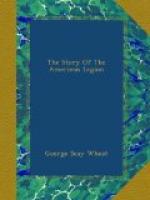But here is the comment. It comes from north, east, south, and west, and it is typical:
New York Times, April 10, 1919.—... It is a pleasure to know that Lieutenant Colonel Theodore Roosevelt, the worthy inheritor of a beloved American name, has called a meeting of soldiers and sailors at St. Louis. Lieutenant Colonel Bennett Clark, son of Mr. Champ Clark, is an associate of Lieutenant Colonel Roosevelt, in the plan for an organization of all our soldiers and sailors as the American Legion. These two gentlemen, associated in a patriotic movement, indicate by their names its common national purpose, apart from politics and partisanship. “A nonpartisan and non-political association is to be formed,” says Lieutenant Colonel Roosevelt, “an association which will keep alive the principles of justice, freedom, and democracy for which these veterans fought.” Justice, freedom, and democracy, without partisanship! The idea is noble. It should prevail.
Leavenworth (Kansas) Post, April 30, 1919.—... The character of the men of the American Army who are promoting it [the Legion] and the high ideals which it professes and proposes to maintain are a guaranty that it will be a power for helpful service in the common family of the nation.
The plan of organization sprang from the desire of serious and able men in the American Army to maintain the high ideals for which all of them have fought, to preserve the soldier comradeship and carry it over into civilian life as an element of broad helpfulness while keeping the record of the army free from the taint of selfish aims. It was also wisely intended to forestall by the creation of one big genuinely representative, nonpartisan and democratic body, the formation of numerous smaller organizations in various places by men intent on exploiting the soldier sentiment and the soldier vote for other than patriotic purposes.
New York Sun, April 11, 1919.—... The American Legion will do an indispensable service. We, who have lived up to the past few years in an agitation of protest against the pension grab must now make our minds over sufficiently to realize that in the new situation we run immediately into danger not of over-pensioning the veterans of to-day but of neglecting them.
The new organization must of course be nonpartisan and non-political. Precedent enough exists in the career of the Grand Army to make that clear. It should include and enjoy the guidance of the most influential military men. Politicians it will have at its service so long as it is well run and organized from within. Despite its proper political limitations, it should serve as the most salutary means to influence returned soldiers to cling to plain old Americanism, shed their martial acquirements and return to plain, praiseworthy citizenship.
Washington Star, April 10, 1919.—...




